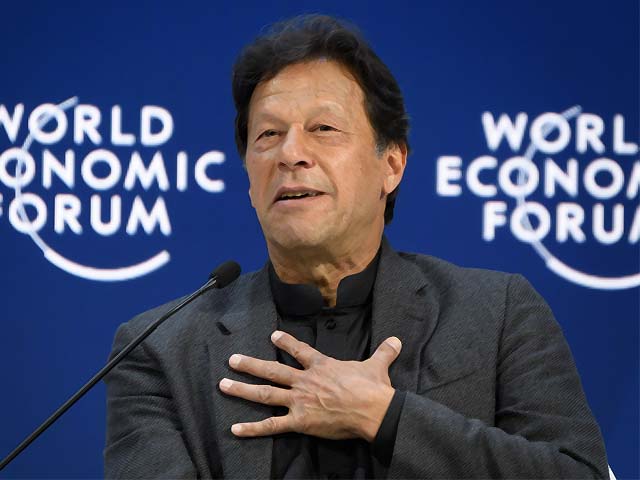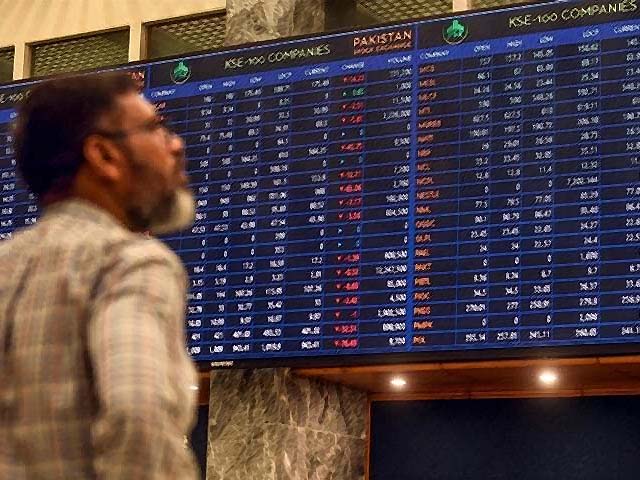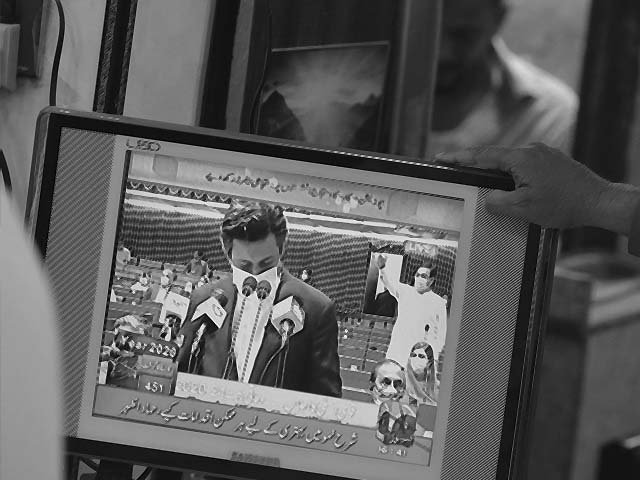
What will happen to the stock market if the PM resigns?
KSE did good solely because of a smooth transition from one elected party to another. That step is now in jeopardy.
In 2007, I underwent a six-hour-long marathon panel interview at the London office of one of the (then) largest hedge funds in Europe called XYZ Capital*. A senior partner – perhaps a PhD holder – drew the entire map of the Middle East, East Asia and Europe, and tested my knowledge about the current affairs of each country turn by turn.
After a gruelling session, the partner remarked,
“An investor may have the best of quantitative minds but markets don’t make sense if the political factors don’t make sense.”
I engraved it then but have only felt it now.
Surviving through the minor speed breakers in the earlier long marches by Imran Khan this summer, the beast in the Karachi Stock Exchange (KSE) roared to shed 1309 points or five percent in a single day and surprisingly reminded the risk-seekers that it is never a one-way ride.
A country of 180 million people – rather unpolished human capital – has had one the lowest growth rates in the region for decades. Spiralling inflation, obdurate poverty rates, oceans of unemployed youth and, of course, our generosity towards the idea of population growth rate has rendered the country with a do-it or leave-it dilemma.
Nailing out all the pros and cons, the current stock market posted exceptional returns solely because of a smooth transition from one elected party to another. As I had articulated in my previous blog, the index continued to march upwards from those levels, riding comfortably on both economic as well as political stability.
However, that very rare achievement is at stake today and outcomes of the following scenarios can lead to further instability.
- The Pakistan Tehreek-e-Insaf’s (PTI) demand for the prime minister’s resignation gets accepted. Though this is exceedingly unlikely to happen, the effect of it will be extremely turbulent if it did.
- PTI’s demand for mid-term elections gets accepted. This will lead to prolonged instability amidst foreigners’ dismay.
- PTI accepts judicial commission but the realisation of unverified votes leads to resignation or further confrontation. This is a distant possibility.
- A best case scenario that no one can extrapolate – after all, politics is a game of deal-making!
All of the above possibilities predominantly lead to one destination – instability.
Nonetheless, the investors should assuredly heave a sigh of relief that the current stock market operations are much more resilient than they were during the fragility of 2008’s crises.
This is owing to the following factors:
- The leverage in the market is phenomenally lower than the past crises.
- The market operations have been frozen by the regulator, thereby preventing opportunities of a safe exit.
- Back in 2008, global financial crises led to protracted de-rating and bearish equity valuations across the world.
- Global oil prices were touching $150/barrel in 2008, thus draining the foreign exchange.
- The risk management practices adopted by the Stock Exchange have become far more prudent to prevent excessive risk taking and animal spirits.
- In 2008, the country had recently recuperated from the tragic assassination of Benazir Bhutto.
Keeping the above factors in mind, the investors should derive an ounce of comfort that a political crisis at these junctures may not be a repeat of the previously envisioned outright collapse of the stock market. On the contrary, following are the considerations that one should be well versed with at these levels:
- The market is still operating (adjusting for anomalies) at forward earnings multiple of 8.5x – assets earning Rs10 are being traded at Rs85.
- Some quality shares, such as power, oil and banking sectors are offering more than 10% dividend yield on a consistent basis.
- Global coal prices are at rock bottom levels, thereby, enhancing the margins of cement players.
- Businesses with lower earnings risk should be held with a perspective of longer term investment.
- Stocks with low liquidity/volumes should be eschewed as you may have to incur +10% losses merely to sell your investments worth a few million rupees.
- Some middle sized companies with vacillating profitability trade at price to earnings ratios of 20-30. These valuations are highly subjective and symptomatic of the investors’ optimism about the future earnings growth. In times of instability and earnings risk, these stocks conveniently lose more than 30% to 40% abruptly.
- Avoid over-exposing yourself to an unwarranted leverage. With 200% leverage, a 10% decline in the value could erode 30% of your investment. A word of caution – your broker is concerned with his commission not with your profit or loss. There is an inherent conflict of interest as he/she would want to earn higher commission and may tempt you to take financial leverage and trade more excessively.
To sum up, the stock market should not be tapped as a gambling table where people put their chips, lose out and come back when they have more money. In fact, it should be used as an investment vehicle to participate in the growth of the corporations and supplement your personal wealth. If the investor shifts the risk and return-seeking appetite from animal to human spirits then the market does continue to enrich the masses. A word of caution to conclude,
“Investors are loss-averse, not risk-averse. If an investor makes 30% profit, he would find it hard to let go of further greed, precisely as he should. However, if an investor incurs a 15% loss, he would find it hard to buy shares, when he really should do”.
*Names have been changed to protect identities




COMMENTS (8)
Comments are moderated and generally will be posted if they are on-topic and not abusive.
For more information, please see our Comments FAQ